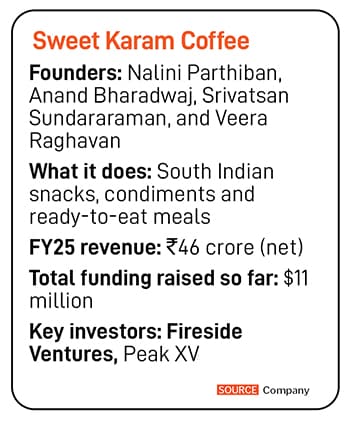Led by grandma’s clean recipes, Sweet Karam Coffee is riding the D2C wave
The South Indian snacking brand serves pin codes across India. The challenge now is to conquer the offline and export markets


In 2024, an unlikely fan of World Cup-winning cricket captain MS Dhoni went viral—an 82-year-old grandma who goes by the name of ‘Janaki Paati’. Paati, Tamil for grandmother, is the beatific, sari-clad, self-proclaimed Chennai Super Kings superfan, who climbed four floors of the Chepauk stadium to see her favourite cricketer in the flesh, as she whistled and cheered him on. She is also the face of Chennai-based South Indian snacking brand Sweet Karam Coffee (SKC), founded by her grandchildren, based on her recipes and principles of cooking.
One rainy evening in 2015, the group of cousins was craving home-style murukku, but didn’t find a suitable alternative in the shops—just processed versions made with palm oil and preservatives. That kicked off the idea for Sweet Karam Coffee—led by their grandmother’s clean and authentic recipes, from banana chips and murukku to pickle and Mysore Pak.
Today, SKC serves pin codes across India, with a robust product range that includes sweets, chips and snacks, filter coffee, papads, pickles, masalas and more. Their DNA is simple: The products have to be South Indian and prepared just like Janaki Paati would make them at home.
The idea was to platform home chefs from their own family initially. “We hadn’t even thought of the FMCG route,” says co-founder and CEO Nalini Parthiban, whose husband, Anand Bharadwaj, is also a co-founder. “We started with 150 sq ft and ₹2,000, would literally pack homemade snacks and sweets in small plastic boxes and store them under our bed. They didn’t have long shelf lives back then. But the vision was always large: To take South Indian tastes and tales to the world.”
They started small, and the four founders (which include Bharadwaj’s cousins Veera Raghavan and Srivatsan Sundararaman) kept their individual corporate jobs for several years at the start. “We came from very, very lower middle-class backgrounds,” Parthiban says. “It took a while before we had the runway to be able to jump into this, and the Covid-19 pandemic was the turning point, as online sales began to boom.”
Parthiban was first to quit her cushy job with an Australian firm, in early 2022. But, by then, Covid-19 lockdowns had ended, and the offline world was beginning to pick back up. “We couldn’t afford to be offline, and the business was beginning to take a hit,” she recounts. “Luckily, one of our products did the talking, and brought in an angel investor as well as funding from Fireside Ventures.”
The product was the tangy avakkai or raw mango pickle, spiced up with some red chilli and turmeric. The Mysore Pak was another hit with early investors.
Fireside Ventures came on board in 2022, with a seed round of $1.5 million. With the money that came in, the team managed to make a shelf-stable product line, packaged with the right technology, just in time for the quick commerce boom.
In April, Fireside participated in another funding round, along with Peak XV, as SKC netted a $8 million investment to support its next phase of growth.
Sweet Karam Coffee closed FY25 with a net revenue of ₹46 crore, marking a 4x jump over FY23. The South Indian food brand had earlier raised $3 million.
Also Read: How three founders built Scimplify to fill India's chemical supply gap
In six months of this fiscal, the company has doubled its ARR (annual recurring revenue) to ₹120 crore and is now on track to exit March 2026 at ₹150 crore net revenue, Parthiban says, “with a sustainable 2.5× growth over the previous fiscal”.
“I’d say there are three major reasons why we chose SKC early on,” says Ankita Balotia, vice president, Fireside Ventures. “One, South Indian snacking is already popular—they don’t need to create a new habit. However, no one is serving this space right—there’s no Haldiram for South Indian snacks. Second, no one was speaking to the consumer of today—even back then, they had the foresight to focus on clean ingredients, which is a big USP today.”
“And third,” she continues, “they have strong storytelling: The identity of Janaki Paati is so cemented, on social media or otherwise, that people buy into that feeling of nostalgia, of home, so much so that they believe Janaki Paati is the founder of the brand.”
Most importantly, Balotia adds, the founders had great execution capabilities. “When we invested, they were barely doing ₹10 crore ARR. Within two years, they grew 10x to ₹100 crore ARR, and that’s a testament to Nalini’s leadership,” she says. “The founders didn’t come from a traditional pedigreed background, so that was a big conviction call for us.”
While popular on quick commerce, SKC’s own website and app continue to be a big priority, bringing in more than 40 percent of their overall sales. The challenge now is to conquer offline and the export market. While they claim to be in 32 countries, international markets form just a couple of percent of their overall pie. “We’re also building a more diversified, guilt-free product range that will go deeper into the kitchen,” says Parthiban.
First Published: Oct 29, 2025, 11:29
Subscribe Now(This story appears in the Oct 31, 2025 issue of Forbes India. To visit our Archives, Click here.)
